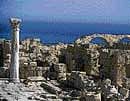Indian High Commissioner Ashok Kumar told Deccan Herald that discussions will be on bilateral, regional and int

ernational issues, including climate change. Patil will be briefed on the course of UN-brokered negotiations on the reunification of Cyprus, divided since Turkey occupied the north in 1974. The president will also meet some 200 members of the Indian community, now 4,000-4,500 strong, due to the influx of IT experts, students and household help.
The president is accompanied by Minister of State for Human Resource Development D Purandeswari, external affairs ministry secretary Vivek Katju, president’s secretary Christy Fernandez, and spouse Devisingh Ramsingh Shekhawat. A delegation of Indian businessmen from 21 firms — including Infosys, the Apollo Hospitals Group, and Videocon Group and from three chambers of commerce is also arriving in Cyprus to discuss cooperation in healthcare, biotechnology, oil and gas development, solar energy, and environment.
Trade between the two countries rose from 39.78 million euros in 2007 to 54.46 million euros in 2008. Small Cyprus, with a total population of just over one million, has a great deal in common with vast India. Both were British colonies which struggled for independence, remain members of the Commonwealth and suffer from partition, India from the agreed division of the sub-continent into two states, India and Pakistan; Cyprus from de facto partition imposed by mainland Turkey.
Cyprus won its freedom in 1960 but, thanks to the British policy of divide-and-leave, the new republic was beset by troubles between the 82 per cent majority Greek Cypriot and 18 per cent Turkish Cypriot communities. This was exacerbated by intervention by their respective motherlands, Greece and Turkey, and led to an attempted coup by the Greek military junta against the government in 1974 and the Turkish invasion and occupation of 36 per cent of the island.
Cyprus’ first president, Archbishop Makarios and Indian Premier Jawaharlal Nehru were co-founders of the Non-Aligned Movement and with Yugoslavia’s Tito and Egypt’s Gamal Abdel Nasser joined forces to keep some distance from the Cold War western and eastern blocs.
Indian generals also helped keep peace in Cyprus following the outbreak of intercommunal violence in 1963. The first commander of the UN force established in March 1964 was P S Gyani and the second was K S Thimayya (after whom the major coastal avenue in the port city of Larnaca has been named).
Lt Gen Prem Chand, who had commanded UN action against secessionists in the Congo in 1962, led the UN force in Cyprus during the Turkish invasion 22 years later. UN troops and elements of the Greek contingent based on the island fought off a Turkish attack on the international airport at the capital Nicosia, a strategic locality which remains in the UN-controlled buffer zone.
A blood tie with Indian jawans was forged in 1962 when President Makarios, on a state visit to India, donated blood for the armed forces then fighting the Chinese. Of his successors, all but the current president (who has been in office for less than two years) have visited India.
Makarios heir, Spiros Kyprianou, travelled to Srinigar where Kashmiris I met a few months after his visit revealed that Cyprus should have such a high profile in India. George Vasiliou followed in Kyprianou’s footsteps a few years later. Cyprus’ forth president, Glafkos Clerides married Indian citizen Lila Erulkar from Surat. Her doctor father was a close ally of the Frontier Gandhi, Khan Abdul Ghaffar Khan. Tassos Papadopoulos, the fifth president, was the first to visit Bangalore during his state visit to India in 2006.
President V V Giri came to Cyprus in 1972 and R Venkataraman in 1988 while Prime Minister Indira Gandhi visited in 1983 when the street in front of parliament was renamed for her father. Following her assassination, the road on which the Indian High Commission is located was named for her. Former Premier A B Vajpayee visited in 2002.
Next year Cyprus, a member of the European Union since 2004, celebrates half a century of independence. Brought to its knees 35 years ago, when Turkey seized the north and 70 per cent of the island’s productive capacity, Cyprus rallied and its hard-working people created what the correspondent of ‘The Economist’ of London called an economic “miracle in half an island.”
Cyprus not only rebuilt — without recovering assets lost or looted in the Turkish occupied area — but developed a strong economy which was classified as the best performing in the Eurozone before the 2008-2009 global financial meltdown. Cyprus has managed to ride out the worst of the crash while India, with its huge domestic economy is prospering. Like India, Cyprus is a vibrant democracy and a source of emulation for emerging democracies.